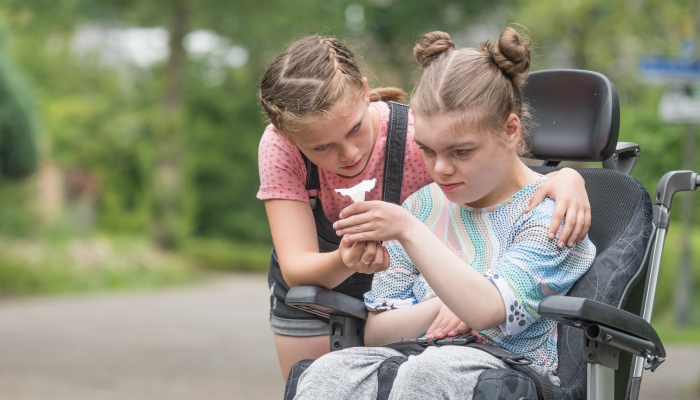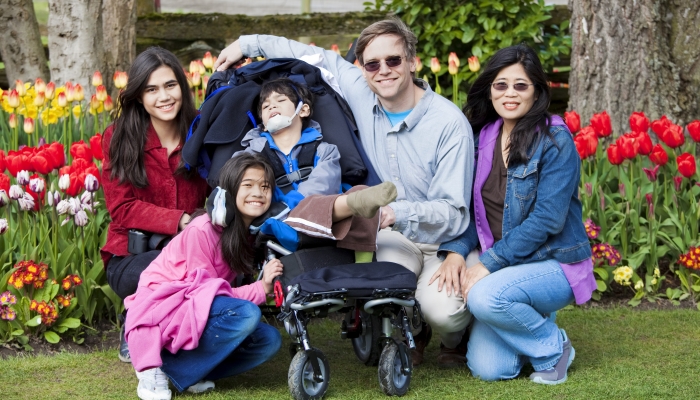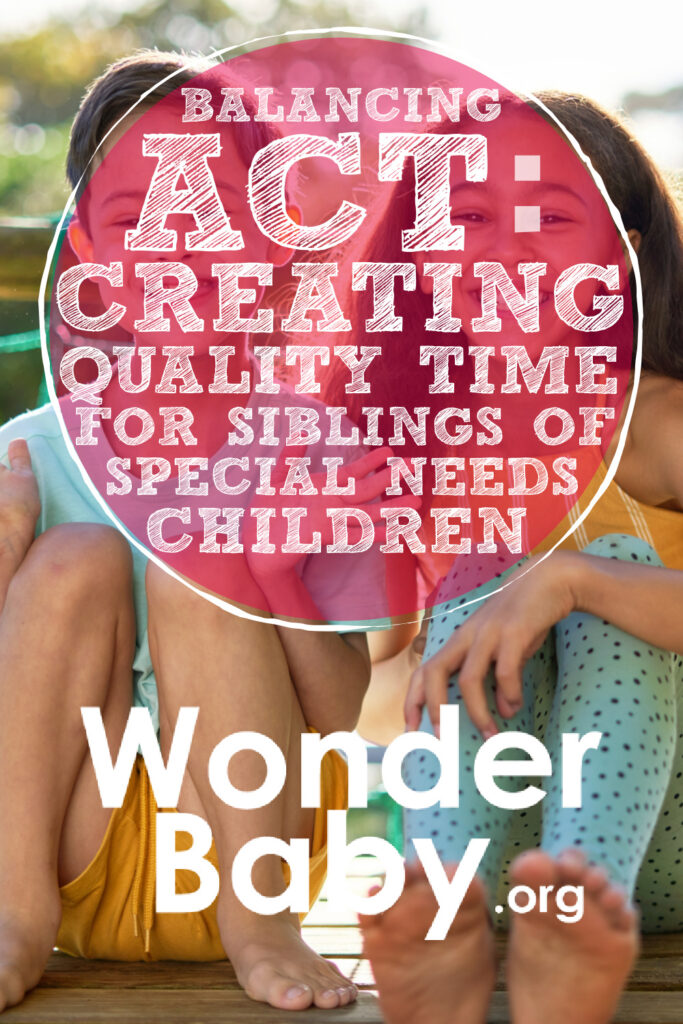Balancing Act: Creating Quality Time for Siblings of Special Needs Children

- The siblings of special needs kids may experience a range of emotions growing up alongside a brother or sister with a disability.
- Although family demands can be a difficult juggle, spending one-on-one time with your child is vital for making sure they don’t feel their needs are overlooked.
- Siblings of a special needs child may react in different ways if they’re feeling too much stress or pressure.
- Open communication, building sibling bonds, and widening your circle of support to include support groups or counseling can help a child who may be struggling.
Children who grow up with a sibling with a disability often show resilience, empathy, and independence, and become excellent advocates. They learn a lot from their brothers and sisters and their experiences and abilities.
However, the brother or sister of a person with autism, Down syndrome, or other types of neurodiversity or physical disabilities can often take on a lot of emotional stress and responsibility which their parents may not always see.
Giving some parental attention and time to check in on the needs of a brother or sister of a special needs sibling will help them feel supported and like their concerns are also a priority in the family.
When the family works as a team to support siblings, everyone benefits, although it can be a delicate balancing act for a parent to create quality time for siblings of special needs children.
Understanding the Sibling Experience

Siblings of children with disabilities may experience different conflicting emotions as they grow up alongside a brother or sister with special needs.
One day they may be protective, supportive, and engaged with their disabled sibling, helping their parents or caregivers with interventions. The next day, they might feel anger, guilt, or resentment because their needs seem to always come second.
While it’s normal and understandable for siblings to experience these feelings, it’s also important to address these emotions to let your kid know they’re important and integral to the family.
The Emotional Spectrum
The American Academy of Pediatrics11. Siblings of Children with Chronic Illnesses or Disabilities. HealthyChildren.org. 2015. https://www.healthychildren.org/English/health-issues/conditions/chronic/Pages/Siblings-of-Children-with-Chronic-Ilnesses.aspx (AAP) recognizes that siblings may feel a spectrum of emotions about a sibling with a disability including:
- Guilt that they aren’t disabled themselves.
- Worry that they caused the disability or that they will become disabled.
- Anxiety about their sibling’s health, their parents’ feelings, or what the future holds.
- Jealous of the attention their sibling gets from the family.
- Resentful about responsibilities they’re expected to take on.
- Embarrassment about their sibling in public.
- Anger about the way their sibling is treated by others or about negative attention, like name-calling.
Studies have documented22. Shivers, C. M., & Plavnick, J. B.. Sibling Involvement in Interventions for Individuals with Autism Spectrum Disorders: A Systematic Review. Journal of Autism and Developmental Disorders. 2014;45(3), 685–696. https://doi.org/10.1007/s10803-014-2222-7 that when siblings are involved in helping with interventions for their disabled brother or sister, both children benefit.
Siblings of children with disabilities are often empathic, understanding, compassionate and patient. They are resilient and creative problem-solvers. They are caring friends and later on, they make supportive partners.
However, it’s important to guard against burnout, anxiety, and stress that extra expectations or responsibilities may cause a brother or sister.
Parentification33. Tomeny, T. S., Barry, T. D., & Fair, E. C.. Parentification of adult siblings of individuals with autism spectrum disorder: Distress, sibling relationship attitudes, and the role of social support. Journal of Intellectual & Developmental Disability. 2017;42(4), 320–331. https://doi.org/10.3109/13668250.2016.1248376, or feelings of responsibility that a sibling may take on in childhood for a special needs child, has been shown to lead to higher levels of distress in adult siblings unless they have social support.
Recognizing the Need for Individual Attention
It may be helpful to parents to look for warning signs that a child with a special needs sibling may need parental attention, such as:
- Anxious behavior.
- Depression.
- Withdrawal.
- Anger.
- Losing interest in friends, activities, or hobbies.
- Not performing well in school.
- Pushing themselves too hard to excel in school or trying to be “extra good.”
- Rebellious behavior.
- Acting out or attention-seeking behavior.
Studies have shown that the siblings of special needs children have a higher rate of mental illness44. Caliendo, M., Lanzara, V., Vetri, L., Roccella, M., Marotta, R., Carotenuto, M., Russo, D., Cerroni, F., & Precenzano, F.. Emotional–Behavioral Disorders in Healthy Siblings of Children with Neurodevelopmental Disorders. Medicina. 2020;56(10), 491. https://doi.org/10.3390/medicina56100491 and emotional fragility in their future due to the levels of stress they experience.
The warning signs of stress exhibited by special needs siblings will vary depending on their age. Younger children may lash out physically or become very emotional. Older siblings may withdraw, isolate, worry excessively, or take on too much responsibility.
It’s important to remember, however, that siblings of special needs kids also derive independence, sensitivity, and other life skills from their experiences with their brothers and sisters.
The key is to make sure they don’t feel pressure or responsibility to the point of overwhelm, anxiety, or burnout.
Creating Quality Time

The needs of a child with disabilities and the demands of a busy family life can make it difficult for parents to always find the time to support other children whose challenges may not be visible.
However, the good news is that helping your kids process their concerns and feelings about other siblings doesn’t have to take a lot of time or energy. It doesn’t have to be formal, scheduled, or intense.
Sometimes a conversation in the car on the way to soccer practice can be enough to offer reassurance to a child that they are an important and valued part of your whole family.
One-on-One Time
Spending individual time with your kids in a safe space where they are free to express themselves is one of the most important things you can do to support them.
It may sometimes be difficult as a parent to hear what your child is worried about, but allowing them to talk with you and have your attention is critical for letting them know that they are also a priority in your family.
Try some of the following ideas to engage with the sibling of your special needs kid:
- Develop a daily routine your child can rely on as their private time with you each day, for example, sitting and talking just before they go to bed, having a daily breakfast hug, or doing a feelings check-in on the way to school.
- Schedule an individual activity your child enjoys once a month where it’s just the two of you, like going to the movies or out for dinner at a favorite restaurant.
- Do something regularly with your child that they really enjoy, like baking, running, or arts and crafts, which will also give them time to speak with you informally.
- Celebrate your child’s successes.
Making time for siblings as a special needs parent will be helpful to your children, will cement your relationship with them, and will help the whole family feel secure in the face of challenges that come with raising a child with a disability.
Inclusive Family Activities
Another way of strengthening bonds between parents and children and between siblings is by doing activities that include all members of the family.
Play board games, cook, bake, sing, or do an art project that lets all your kids get involved. Go on accessible outings that everyone can enjoy or that can be adapted like bowling, swimming, or soft play.
By doing activities that everyone can engage in, you can balance the interests and abilities of your children so that they don’t feel like only one child is the focus.
Communication Strategies

Clear, age-appropriate communication with your children is important to minimize anxiety and make the sibling of a child with a disability feel that their worries and concerns are heard and seen.
Try the following strategies with your kids:
| Open and honest conversations |
|
| Using age-appropriate language and concepts |
|
| Tell your kids what to expect |
|
| Strengths and weaknesses |
|
| Family meetings and check-ins |
|
Talking frequently with your kids will improve family communication and also give you important insight into how siblings feel about your family dynamic.
Fostering Sibling Relationships
Feelings of jealousy, rivalry, and conflict arise from time to time between all siblings. However, when parents necessarily have to focus on a special needs child, these situations can feel even more intense.
Yet, by encouraging strong relationships between siblings, parents can help their children foster bonds that will last into adulthood.

Building Bonds Between Siblings
To build bonds between siblings, try the following:
- Encourage cooperative play and teamwork with games and activities that are inclusive or that can be adapted.
- Involve siblings in celebrating each other’s milestones and successes to encourage pride in one another.
- Encourage siblings to teach each other skills.
- Set challenges for all siblings to meet and help them support each other in reaching goals.
Addressing Rivalry and Conflicts
Even if siblings have a strong bond, conflict is an inevitable part of family life. If you find that emotions are running high or resentment is building, think about the following ways of addressing it:
- Give each child space and time apart for individual interests.
- Give each child individual time with parents every day, even if it’s just a few minutes.
- Distribute praise, positive attention, and discipline equally and fairly.
- Encourage siblings to talk to one another when conflict arises.
- If a sibling with a disability needs more attention, explain what’s happening and why to other kids so they understand the situation is not favoritism.
Support and Resources for Siblings

By broadening the circle of support to include teachers, peers, relatives, professionals and friends, parents can support the brothers and sisters of their special needs child.
External Support Systems
Even if you have open communication, spend one-to-one time with your kids, and try to foster sibling bonds, it’s still a good idea to show your child that they can also ask for help outside the immediate family.
Widening the family’s support system and involving professionals like therapists or counselors can also help take the pressure and stress off of parents of children with disabilities who are juggling many moving parts of family life.
Counseling and finding a sibling support group appropriate for your child’s age can be very helpful for you and your child.
Community groups and organizations that work with people with disabilities can also help empower siblings to advocate for their family members with disability which can be a positive outlet.
References
- Siblings of Children with Chronic Illnesses or Disabilities. HealthyChildren.org. (2015, November 21). https://www.healthychildren.org/English/health-issues/conditions/chronic/Pages/Siblings-of-Children-with-Chronic-Ilnesses.aspx
- Shivers, C. M., & Plavnick, J. B. (2014). Sibling Involvement in Interventions for Individuals with Autism Spectrum Disorders: A Systematic Review. Journal of Autism and Developmental Disorders, 45(3), 685–696. https://doi.org/10.1007/s10803-014-2222-7
- Tomeny, T. S., Barry, T. D., & Fair, E. C. (2017). Parentification of adult siblings of individuals with autism spectrum disorder: Distress, sibling relationship attitudes, and the role of social support. Journal of Intellectual & Developmental Disability, 42(4), 320–331. https://doi.org/10.3109/13668250.2016.1248376
- Caliendo, M., Lanzara, V., Vetri, L., Roccella, M., Marotta, R., Carotenuto, M., Russo, D., Cerroni, F., & Precenzano, F. (2020). Emotional–Behavioral Disorders in Healthy Siblings of Children with Neurodevelopmental Disorders. Medicina, 56(10), 491. https://doi.org/10.3390/medicina56100491
- Krueger, A. (2023, October 16). 5 Ways to Support Siblings in Special Needs Families. Child Mind Institute. https://childmind.org/article/5-ways-to-support-siblings-in-special-needs-families

Related Posts

Eye Conditions and Syndromes, Visual Impairment
Neuralink Announces Plans to Restore Sight to the Blind with Brain Chip
Elon Musk’s company Neuralink has announced plans to begin human trials of its new “Blindsight” brain chip by the end of 2025.

Special Needs
5 Spring Cleaning Tips for Families of Children with Disabilities
Spring cleaning is an opportunity to create a more accessible, organized, and supportive space for your child with disabilities. Declutter, deep clean, and refresh!

Visual Impairment
The Gift of Understanding: How a Young Child Helps His Blind Father Navigate Life
When a parent is blind, it’s natural for people to wonder how their sighted child will adapt. Will they struggle to understand their parent’s needs? Will they feel burdened by...